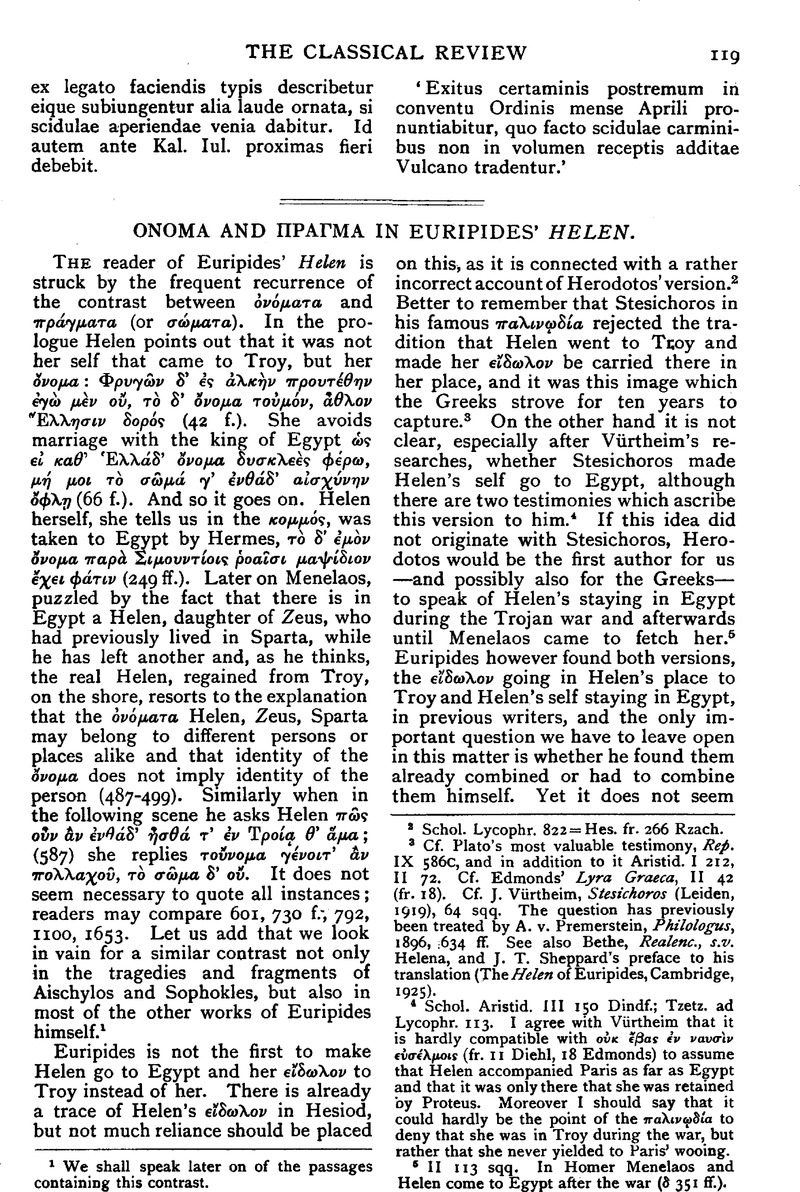Published online by Cambridge University Press: 27 October 2009

page 119 note 1 We shall speak later on of the passages containing this contrast.
page 119 note 2 Schol. Lycophr. 822 = Hes. fr. 266 Rzach.
page 119 note 3 Cf. Plato's, most valuable testimony, Rep. IX 586cGoogle Scholar, and in addition to it Aristid. I 212, II 72. Cf. Edmonds', Lyra Graeca, II 42 (fr. 18)Google Scholar. Cf. Vürtheim, J., Stesichoros (Leiden, 1919), 64 sqqGoogle Scholar. The question has previously been treated by Premerstein, A., Philologus, 1896, 1634 ffGoogle Scholar. See also Bethe, , Realenc., s.v. Helena, and J. T. Sheppard's preface to his translation (The Helen of Euripides, Cambridge, 1925).Google Scholar
page 119 note 4 Schol. Aristid. III 150 Dindf.; Tzetz. ad Lycophr. 113. I agree with Vürtheim that it is hardly compatible with οὐκ ἔβας ν ναυσíν εὐσλμοις (fr. II Diehl, 18 Edmonds) to assume that Helen accompanied Paris as far as Egypt and that it was only there that she was retained by Proteus. Moreover I should say that it could hardly be the point of the παλινῳδα to deny that she was in Troy during the war, but rather that she never yielded to Paris' wooing.
page 119 note 5 II 113 sqq. In Homer Menelaos and Helen come to Egypt after the war (δ 351 ff.).
page 120 note 1 Cf. Jebb's notes to Soph. Ai. 430. Even Euripides uses etymologies, following, I should say, the tradition of his εἶδος. He does not seem to be aware of the contradiction he commits by introducing etymologies in Hel. 13 (not to speak of the disputed words in 9 f.); perhaps καλοσιν is meant to indicate the popular belief. See also 820.
page 120 note 2 Cf. Warburg, M., Neue philolog. Untersuchungen 5 (1929), 65 ff., 76 fGoogle Scholar.
page 120 note 3 Prodikos' περ νομáτων ρθτηος had a different object. Demokritos' view that the νματα are not φσει, but τχνῃ, leads to similar conclusions (55 B 26 Diels), but he does not seem to have influenced Euripides. Cf. Steinthal, H., Geschichte d. Sprachwissenschaft bei d. Griechen (2 1890, Berlin), 76 ff.Google Scholar, 114 ff.; Hoffmann, Ernst, Sprache und ar chaische Logik (Tübingen, 1925), 17 ff.Google Scholar
page 120 note 4 Decharme, P., Euripide et Pesprit de son théǎtre (Paris, 1894)Google Scholar; Masqueray, P., Euripide et ses idées (Paris, 1908)Google Scholar; Nestle, W., Euripides der Dichter der griech. Aufklärung (Stuttgart, 1901)Google Scholar.
page 120 note 5 I adopt Wecklein's λλλοιπε, which the sense requires; cf. the scholia: οὐ λλοιπε MSS. The parallels in the Helen with which I have dealt in this paper may be regarded as a further argument in favour of Wecklein's conjecture. Cf. also Or. 455.
page 120 note 6 See Pohlenz, M., Die griechische Tragödie II: Erläuterungen (Leipzig-Berlin, 1930), 119Google Scholar, and the books and papers he mentions. Perrotta, Stud. It. N.S. 6 (1928) 5 ff. may be added to them.
page 121 note 1 ‘ In visu operatur intellectus.’ So'Professor Murray explains the last line, rightly as I think. But can we understand it thus without assuming that there is a theory behind, which identifies ασθησις and πιστμη ?.